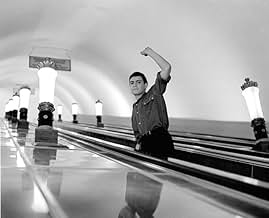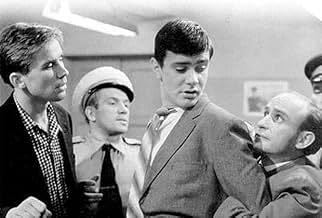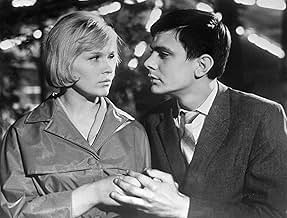O jovem escritor siberiano Volodya encontra Kolya no metrô de Moscou na sua visita a um autor famoso. Eles não sabiam que uma história de amor poderia começar nesse lugar.O jovem escritor siberiano Volodya encontra Kolya no metrô de Moscou na sua visita a um autor famoso. Eles não sabiam que uma história de amor poderia começar nesse lugar.O jovem escritor siberiano Volodya encontra Kolya no metrô de Moscou na sua visita a um autor famoso. Eles não sabiam que uma história de amor poderia começar nesse lugar.
- Direção
- Roteirista
- Artistas
- Prêmios
- 1 indicação no total
- Tantsuyushchaya na aerodrome
- (as A. Aleynikova)
- Prodavshchitsa morozhenogo
- (as V. Ananina)
- Devushka pod dozhdem
- (as S. Besedina)
- Konferanse
- (as V. Vasilyeva)
- Khozyayka sobaki
- (as N. Vinogradova)
- babushka Koli
- (as Ye. Melnikova)
- Katya - sestra Kolki
- (as I. Mirosnichenko)
- Angelina Petrovna
- (as A. Pavlova)
- Dezhurnaya na stantsii metro
- (as A. Rumyantseva)
- Nadya
- (as I. Skobtseva)
- mama Nikolaya
- (as L. Sokolova)
- Anya
- (as D. Stolyarskaya)
- Svetka
- (as I. Titova)
Avaliações em destaque
I would place it on the same level as Fellini's Roma or Woody's "Manhattan" - yes, I think it is that good and I see it as the love letter to the magnificent city on the Moskva River which used to by My city, too. It is about spring in Moscow of 1963, (in more ways than one), about youth, first love, smiles, sudden meetings and inevitable goodbyes. It takes place on the streets of Moscow, in its parks, subway stations, and movie theaters. It follows the "Moskvichi" and the guests of the city, young and middle-aged, romantic and tired, friendly and suspicious, happy and disappointed, wise and naive in the series of short vignettes and it introduces us to the characters whom we get to meet, to like, and to follow on their journey in the course of one long sunny rainy spring day.
I think it is a best role of well-known Russian actor and director Nikita Mikhalkov - and it's of no doubt the most sincere work of him. And I also should say about sparkling supporting role of Vladimir Basov - his clever Floor polisher is really wonder :))
Just as in the end of a news hour, there's a 60 second feel-good segment, in every generation, there's its own feel-good story. The scrutiny of how realistic those dreamy fantasies of the past are is beyond the point. Relaxing in the backyard's arm chair with a glass of well-deserved glass of wine reflecting on the past is of course a part of the drill.
In the end, this patriotic narcissistic drivel could have been "Ya shagayu po Berlin (1964)" or "Ya shagayu po Hiroshima (1964)" full of love, spring vitality and romanticism. Which is of course fine as the life obviously goes on.
And perhaps it's fine. It depends on the viewer's outlook. But for some, the film will be clearly interspersed with visual and conceptual references aggrandising and beautifying what the country has gone through in the preceding 50 years. A sort of the Soviet Union of Amnesia that is. A common propaganda "feel-good" trick in a wide range of other tricks in the toolboxes of various Ministries of Truth across the globe.
One thing is for sure: this is a movie done by the power which won the war, so history is written accordingly. Small but curious detail.
Você sabia?
- Citações
Volodya Yermakov: Arriving or departing?
Girl at the Airport: Waiting for arrivals.
Volodya Yermakov: Who is it?
Girl at the Airport: My husband.
Volodya Yermakov: He's lucky to have someone to meet him.
Girl at the Airport: Get married, you'll have someone as well.
Volodya Yermakov: And you are both happy?
Girl at the Airport: Yes, we are.
Volodya Yermakov: It never happens.
Girl at the Airport: Believe me, it happens.
- Trilhas sonorasA ya idu, shagayu po Moskve
Music by Andrey Petrov
Lyrics by Gennady Shpalikov
Performed by Nikita Mikhalkov
Principais escolhas
- How long is Walking the Streets of Moscow?Fornecido pela Alexa
Detalhes
- Tempo de duração1 hora 18 minutos
- Cor
- Mixagem de som
- Proporção
- 2.35 : 1
Contribua para esta página
































